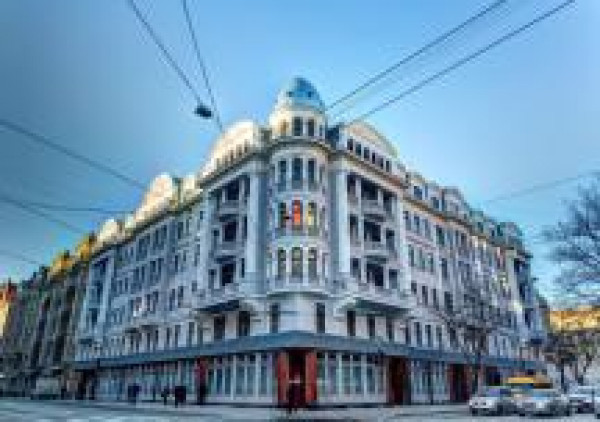








“For the safe operation of the Teter’s House at Brīvības iela 61, Riga, and for the temporary preservation of the operations of the Museum of the Occupation of Latvia, a decision on the future of the building must be made by 27 January 2023 and at least 300,000 euros must be found for the prevention of the hazard of use established by the State Construction Control Bureau (BVKB). The attracted funding will allow maintaining of the operations of the museum in Teter’s House for about a year, during which at least another 400,000 euros must be raised,” informs Andris Vārna, Board Member of the SJSC State Real Estate (SRE).
Since 2021, SRE has been asking for a decision to be made regarding the use of the entire Teter’s House in order to maintain the operation of the Museum of the Occupation of Latvia in the building. SRE, as a state capital company, is responsible for the sustainable management and development of the properties under its management, while the tenant of the property is responsible for its use.
“SRE works with state resources, so it must carefully evaluate the profitability of the invested funds. Investing significant funds of the capital company in a short-term solution does not correspond to sustainable real estate management; moreover, it will not fundamentally help to solve the long-term problem – finding the optimum use and the required funding for the Teter’s House. If the industry does not make a decision about the future of the building by the end of January, SRE may have to ask the Museum of the Occupation of Latvia to temporarily vacate the museum premises until the danger is eliminated,” says A. Vārna.
The capital company has developed a construction intention for the necessary emergency works. The project includes the prevention of arbitrary construction – and restoration of the inner courtyard covering, which would provide an opportunity to continue the operation of the building and the use of the museum premises until 7 May 2024 or until the decision of the industry on the future of the building.
On 18 October 2022, the capital company received a warning from BVKB about the need to implement the submitted construction intent for prevention of hazard by 28 February 2023. If the hazard identified by the bureau is not eliminated, BVKB will have to apply a fine to the SRE, which for a legal entity can reach up to 10,000 euros for each time the fact is established. In 2022, SRE fenced off the dangerous territory – the courtyard and the passage – so that unauthorised persons could not enter it.
It has already been reported that the hazard identified by the State Fire and Rescue Service in Teter’s House must be eliminated by 7 May 2024. The implementation of these works requires at least 400,000 euros. The hazard is related to the automated fire detecting and emergency alarm system. Funding would allow fixing of the internal fire water system and electrical installation, as well as sealing of the leaky areas in fireproof constructions. Whereas, for the full operation of the building and preservation of cultural and historical values, at least 14 million euros is needed, which will ensure its full renovation and breathe new life into it.
It can be concluded from the technical opinion of BVKB for 2021 that the rest of the property cannot be put into operation without the capital renovation of the building. Urgent works are also necessary for the safe operation of the premises rented by the Museum of the Occupation of Latvia, about which the museum and the Ministry of Culture were informed by SRE.
Currently, almost 92% of the historical building's area is unused. A small part of the building – 690 m2 in the basement and on the ground floor – is occupied by an exhibition about the history of the KGB in Latvia, which is used by the Association of the Museum of the Occupation of Latvia, but the rest of the 8500 m2 building has been empty for a long time. SRE has previously evaluated and proposed several real property development scenarios, including the transfer of property to other state or local government institutions. In 2021, SRE repeatedly conducted a survey of public institutions, but no institution has provided suggestions on how to use this property to offer public functions.
In 2020, the National Cultural Heritage Board granted the building the status of a historic site, but this decision does not resolve the issue of the economic use of the building and the source of funding for restoring the building. At the end of the same year, SRE received objections from the sectoral ministry regarding holding an auction of the House, therefore a decision was made to stop the sale of the building. Property maintenance, expenses for current repairs and capital investments since 2014 exceeds 550 000 thousand euros. In 2021, the losses of SRE for the maintenance of the property alone reached 69 600 thousand euros, while in 2022 – around 54 000 thousand euros.
SRE provides professional real estate management and administration to approximately 350 real estate properties consisting of 975 buildings with a total floor area of 0.95 million m2, along with land beneath the buildings covering 2 ha and more than 599 land properties with a total area of 3441 ha. SRE is one of 23 Latvian companies that has received the highest platinum award as part of the Sustainability Index of the Institute of Corporate Responsibility and Sustainability in 2022, confirming the good governance and sustainability of its operations. The company was founded in 1996 and is 100% owned by the Ministry of Finance.

